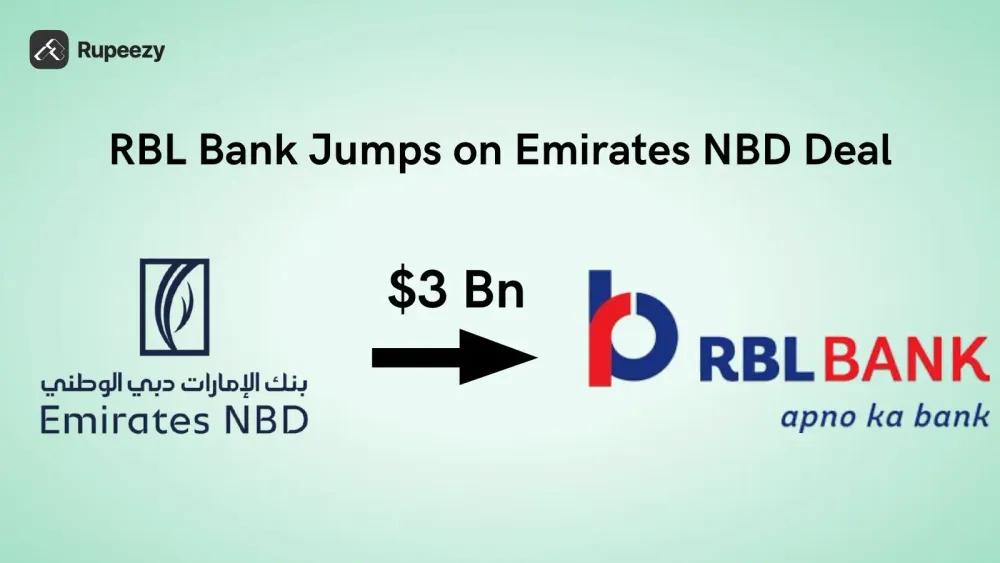RBL Bank Soars 7% on Rs 26,850 Crore Emirates NBD Deal


00:00 / 00:00
RBL Bank shares soar 7% touching a day’s high price of Rs 320.45 on NSE after it entered a landmark transaction with Emirates NBD Bank PJSC (ENBD), through which ENBD will acquire a majority stake in RBL Bank via a $3 billion preferential share infusion. This deal marks a major milestone in Indian banking, elevating RBL Bank into the league of large, well-capitalized financial institutions and strengthening its strategic links with the Middle East. The transaction also underscores increasing foreign investor interest in India’s improving financial sector while opening up fresh business avenues and deepening cross-border economic ties.?
Deal Structure and Timeline
ENBD to invest approximately $3 billion, translating to around Rs 26,850 crore, for up to a 60% controlling stake in RBL Bank, with additional acquisition possible through a mandatory open offer of Rs 280 per share to public shareholders for up to 26% as per SEBI Takeover Regulations. The infusion is expected to be completed over the next 5–8 months, with full regulatory, RBI, and shareholder approvals pending. Upon completion, the India branches of Emirates NBD will be amalgamated with RBL Bank, aligning with RBI’s guidelines and ensuring a seamless integration of both institutions.?
Business Impact and Prospects
The capital injection will position RBL Bank among the most well-capitalized banks in India, with its net worth expected to surge to Rs 42,000 crore and its capital adequacy ratio projected to reach 40%, far above industry norm, as per various sources. The transaction can enable RBL Bank to expand its distribution network, accelerate investment in technology and digital payments, and create more diversified income streams. ENBD’s global banking expertise and strong wholesale banking business in India can create synergies, allowing RBL to strengthen its corporate banking franchise and be able to underwrite larger, high-quality corporate loans. The management has highlighted aspirations to transition from a mid-sized to a large bank within three to five years, leveraging ENBD’s strategic guidance.??
Expansion in Wealth Management and Remittance
RBL Bank plans to launch its wealth management business in the wake of the ENBD deal, taking advantage of the latter’s experience and resources. The transaction also positions RBL Bank to capture more of the India-Middle East remittance market, which remains highly lucrative, given that nearly 50% of Indian migrants are based in GCC countries, and the UAE accounts.
Governance, Regulatory Backing, and Strategic Intent
The deal is still subject to regulatory approval, but as per Reuters, it hasbeen mentioned that it has informally communicated with Reserve Bank of India (RBI). Foreign ownership in private banks in India is capped at 74%, with not exceeding 15% from a single foreign institution unless the RBI exempts. The governance structure post-deal will see ENBD managing half the board, with the remainder composed of independent directors.?
Q2FY26 Financials Overview
RBL Bank reported a net profit of Rs 179 crore for Q2FY26, marking a 20% year-on-year decline due to higher operating costs. Net interest income (NII) came in at Rs 1,551 crore, down 4% YoY, while net interest margin (NIM) edged up sequentially to 4.51%. The bank maintained strong operating profit growth, reaching Rs 728 crore for the quarter, up 4% QoQ.?
Other income remained stable at Rs 932 crore, while provisions decreased 19% YoY to Rs 500 crore. Gross NPA improved sequentially to 2.32% from 2.78%, though net NPA rose slightly to 0.57% from 0.45%. Advances increased to Rs 1.01 lakh crore, with retail contributing 60% and wholesale at 40%. Despite a drop in profit, asset quality indicators and capital buffers showed resilience ahead of the Emirates NBD transaction.
In short, the Emirates NBD–RBL Bank deal not only boosts RBL’s capital base and market stature but also opens new pathways for cross-border banking, technology adoption, and other initiatives.
The content on this blog is for educational purposes only and should not be considered investment advice. While we strive for accuracy, some information may contain errors or delays in updates.
Mentions of stocks or investment products are solely for informational purposes and do not constitute recommendations. Investors should conduct their own research before making any decisions.
Investing in financial markets are subject to market risks, and past performance does not guarantee future results. It is advisable to consult a qualified financial professional, review official documents, and verify information independently before making investment decisions.

All Category






